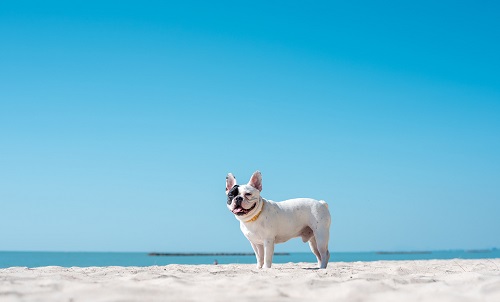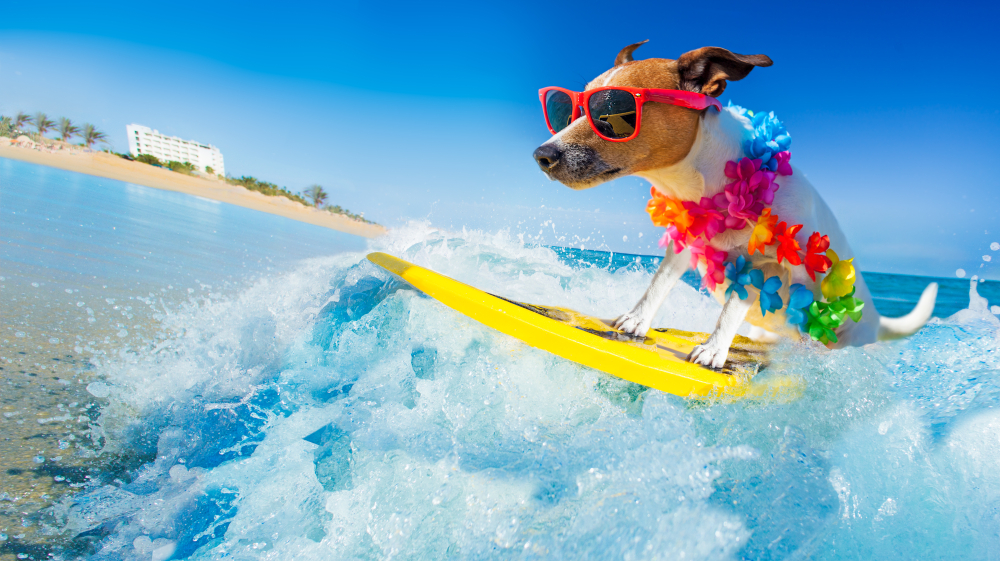SPF 100. Waterproof sunscreen. Zinc oxide sticks. Sun tan lotions and sprays. These are just a few different types of skincare products that people use year-round to protect themselves from the harmful UV rays of the sun. But what many folks aren’t aware of is that their dogs are prone to the risks of sun exposure, too. According to the American Kennel Club, canines can get sunburn, as well as other skin diseases and complications related to overexposure to the sun’s powerful rays. That’s why it’s so important for pet parents to take the necessary precautions to protect their four-legged friends. For dog owners wondering “does my dog need sunscreen?”, the answer is a resounding yes. Read on to learn more about the safety protocols required to keep sun-related canine health problems at bay.
The Risks Of Sun Overexposure To Dogs: Know The Facts
Humans and their furry friends suffer from a lot of the same health conditions – from seasonal allergies and heart disease to diabetes and asthma, research has shown that pets share many of the same diseases their owners do. However, many pet owners don’t realize that their four-legged companion can not only get a painful sunburn, but that overexposure could possibly lead to serious health issues, such as skin cancer. Additionally, ultraviolet (UV) exposure can potentially rev up or exacerbate pre existing conditions, such as dermatitis and certain canine autoimmune disorders. It can even cause dogs pain or irritation at surgery sites. Keeping this info in mind, experts suggest preventive measures to protect dogs from ultraviolet rays whenever possible.
Protecting Your Pooch: How To Find The Right Sunscreen For Dogs

With virtually dozens of sunscreen products specially formulated just for dogs, trying to figure out which is the best dog sunscreen may seem overwhelming for some pet parents. In order to identify the top picks, reviewers considered many different factors when compiling their results, which may also help dog owners when shopping for the appropriate canine sunscreen. A few crucial things to keep in mind:
- Human sunscreen is a no-no: While the majority of ‘people’ sunscreen products are safe for humans, they may contain sun-blocking ingredients such as zinc oxide or PABA (para-aminobenzoic acid), which are both toxic for dogs if ingested. That’s why man’s best friend should never wear sunscreen made for his human counterparts, as licking (which dogs are prone to do) can lead to accidental ingestion. Always purchase sunscreen specifically made for dogs – a trusted vet or groomer may be able to recommend an appropriate brand and type of product depending on his breed, coat type, activity level and overall condition.
- Read the label: Just like their humans, dogs can be sensitive to certain artificial scents and chemicals. Be sure to read the ingredients carefully, especially for dogs who have any known skin sensitivities, allergies or autoimmune diseases. Pet parents may want to opt for natural dog sunscreen products with organic (or even vegan) ingredients to avoid adverse reactions or irritation.
- Consider the type of product: Another deciphering factor when shopping for dog sunscreen: the type of sunscreen itself. Since some pups have a hard time sitting still, a variety of different doggie sunscreen products have been developed to make ease of application easier, such as wipes, sprays and balms.
- Shop for his breed & coat: When buying sunscreen protection for dogs, it’s essential to keep his breed and coat type in mind. For example, pups with thin or light-colored coats are at higher risk for sun damage (more on breeds who are most at risk in a moment).
- Don’t forget his nose: Just because a pooch may have a heavy coat doesn’t mean his snout isn’t vulnerable to sun damage. For dogs who love frolicking outdoors, there are dog sunscreen products such as Handy Hound SnoutScreen which can provide hours of safe organic sunscreen protection to the sensitive skin on a dog’s nose and face. This multipurpose non-toxic balm also acts as a bug repellant, moisturizer and sun protectant, making it a convenient product for protective pet parents.
The Experts Weigh In…
Most experts recommend waterproof dog sunscreen, which is especially beneficial for active pups. Choose an SPF (sun protection factor) of at least 30 to ensure he’s adequately protected from harmful UV rays.
Sun Damage & Your Dog: Which Breeds Are Most At Risk?

Although all types and breeds of dogs feature some type of exposed skin around their face and ears, certain pups require a bit more TLC when it comes to sunscreen protection. Since some dogs are much more susceptible to getting a sunburn, pet parents should take heed and know their breed – identifying dog breeds who are most at risk can help reduce the instances of serious sun damage. These breeds include:
- American Staffordshire Terrier
- Australian Shepherd
- Boxer
- Bulldog
- Chinese Crested
- Collies
- Dalmatian
- Golden Retriever
- Greyhound
- Pit Bull
- Weimaraner
- Whippet
- White German Shepherd
- Yellow Labrador Retriever
As a general rule of thumb, it’s best to be proactive as a dog owner and keep a quality dog sunscreen on hand, no matter what his breed, age or activity level – it only takes a short time in the sun for long-term effects to accrue that could potentially harm him. Additionally, for dogs with coats that are either hairless, light-colored, patchy or thin, be sure to take an extra layer of precaution (literally) with a dog-friendly sunscreen product. And while pooches who boast a thick or heavy coat may seem safe from UV rays, think again: although they may require less sunscreen or frequent applications, they still require a sun-blocking product to protect the delicate skin on their face, ears, lips and nose. If there’s any uncertainty, pet owners may wish to speak with their vet to determine if their dog is at special risk for sun damage, as well as the best products for his specific breed, coat type and health profile.
How (And How Often) Should I Apply Sunscreen To My Dog?
While it’s crucial to apply sun-blocking products to dogs whenever an outdoor excursion arises, proper sun safety goes beyond a quick spray with doggie sunscreen. Below, some helpful guidelines for fun-in-the-sun safety:
- Protect Sensitive Areas: As mentioned earlier, a dog’s most vulnerable areas to sun damage are his belly, ears, and nose, as well as any other place on his body where the fur is patch or thin. Therefore, owners should take extra precaution and cover these areas with a dog-friendly sunscreen product before going outdoors.
- Preemptive & Proactive: Pet parents can fight the good fight by being prepared: stay vigilant in the face of harsh UV rays by applying sunscreen to dogs at least 20 minutes prior to venturing outside.
- Reapply (& Reapply Again): For active dogs, it’s essential to keep an eye on him in the great outdoors, particularly on a hot, sunny day. Experts recommend reapplying sunscreen at least every 4-6 hours, or more often if he’s playing in the water; if the latter, a high-quality waterproof formula is probably worth investing in.
- Keep Him Hydrated: Keeping dogs cool and comfortable is not only good pet parenting – it can save his life. In addition to stashing a pooch-friendly sunscreen, be sure to carry a collapsible water bowl and clean water, as dogs can get heat stroke just like their humans. Avoid direct exposure to sunlight whenever possible, and look for shady areas to avoid overheating. For more helpful tips on how to keep your dog cool in the summer, click here.
Help! My Dog Has A Sunburn – Now What?
In the unfortunate event that the family dog gets a sunburn, there are a few ways to make him more comfortable. First, know what signs to look for – a sunburn on a dog usually appears as flaking or reddish-tinged skin, and may be warm to the touch. If it appears he has a sunburn, be sure to take him indoors (or at the very least, get him into a shady spot as soon as possible). Pet parents may also want to use a cool compress (e.g, a clean washcloth or rag) or aloe vera on the affected region if it seems like he’s in pain.
For more severe instances or if he seems distressed, it’s imperative to call a veterinarian right away. If the dog has a serious sunburn, the vet may determine that he needs a cortisone product to reduce inflammation. Since reoccurring overexposure to the sun can potentially lead to skin cancer, it’s very important for dog owners to be attentive and use good judgement – prevention is the ultimate weapon against sun damage. Combined with proper sunscreen protection, a healthy dose of caution, and remaining prepared at all times, pet parents can ensure their dog’s skin care safety and well-being, no matter what the weather brings.
Sources Cited:
- Wizeman, Sabina; Saporita, Nicole. “12 Best Sunscreens to Protect Your Skin, According to Skincare Experts.” GH (goodhousekeeping.com), May 26, 2020, https://www.goodhousekeeping.com/beauty/anti-aging/g1288/best-sunscreens/. Accessed September 22, 2020.
- Meyers, Harriet. “Should Your Dog Wear Sunscreen?” American Kennel Club (akc.org), April 11, 2019, https://www.akc.org/expert-advice/health/dog-sunscreen/. Accessed September 22, 2020.
- Konkel, Lindsey. “Pet Share Owners’ Diseases.” Scientific American (scientificamerican.com), September 25, 2012, https://www.scientificamerican.com/article/pets-share-owners-diseases/#:~:text=And%20increasingly%2C%20they%20are%20sharing,play%20in%20these%20dual%20diseases. Accessed September 22, 2020.
- Jones, Sally. “Best Dog Sunscreen: Protect Your Pup From The Sun.” Canine Journal (caninejournal.com), April 28, 2020, https://www.caninejournal.com/best-dog-sunscreen/. Accessed September 22, 2020.




